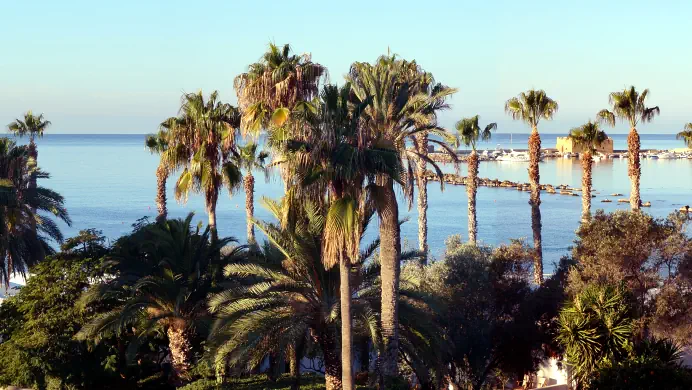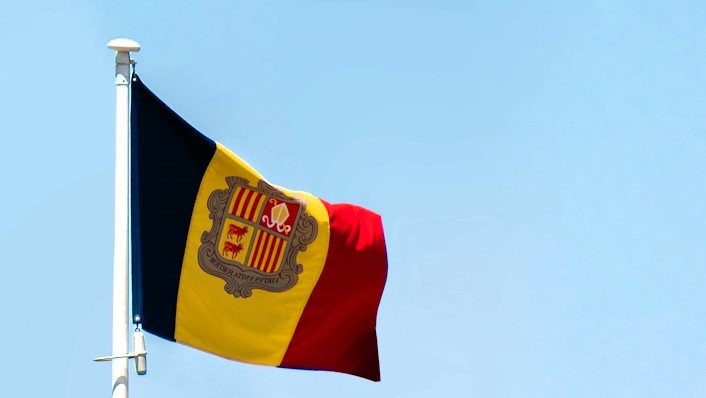Cyprus Non-Dom Regime and Tax Residency: The Complete Guide
Here’s everything you need to know about the non-dom program in Cyprus and its tax benefits.

Many of us have visited Cyprus for a fun holiday – it’s a beautiful island with lots to interest visitors, from gorgeous beaches to ancient Greek sites. But what about turning that short summer break into a long-term move? It’s an appealing proposition for several reasons, not least because Cyprus offers extremely attractive tax benefits. In fact, it might have the best incentives in all of Europe.
Since 2015, Cyprus has had a special tax regime in place for “non-doms” – non-Cypriot individuals who move to the island and make it their primary residence. Under the non-dom program, foreigners in Cyprus are free from paying tax on interest, dividends, and capital gains from listed securities (stocks, ETFs), plus they get a 50% tax reduction on salary income.
For business owners, the situation is even more advantageous. The non-dom program can easily be combined with a limited company in Cyprus, which is taxed at only 12.5% on profits, while dividends paid out to shareholders are exempt from withholding tax.
What’s in this guide?
In this guide, we’ll go through everything you need to know about Cyprus’ non-domicile regime. This includes how the Cyprus tax system works for foreigners and why more and more people are realizing that the island is a great place to relocate to; why people are moving here to minimize their tax burden while enjoying the great weather, food, and relaxed Mediterranean lifestyle.
👋 A necessary disclaimer: Although we use primary sources such as government websites to back up what we write, this article shouldn’t be viewed as official tax or legal advice. Think of it as a handy introduction to the country and its tax system. If you have any doubts, always talk to a certified specialist to figure out what you should do based on your unique circumstances.
Key takeaways
Here’s a quick summary of this article in case you don’t have time to read it all:
- Cyprus offers a variety of personal and corporate tax benefits for business owners, salaried workers, and high-net-worth individuals who move to the island.
- The non-dom tax program in Cyprus exempts foreigners from paying tax on interest and dividends. Capital gains from shares, funds, and bonds are also exempt from taxes.
- High-net individuals, retirees, and financially independent (FIRE) people can live almost tax-free in Cyprus.
- The non-dom tax status is available to most people who are not Cypriots and were not tax residents in Cyprus for the previous 17 out of the last 20 years.
- You can set up a limited liability company in Cyprus and only pay 12.5% corporate tax on the profits. You can receive dividends from the company without paying any dividends tax.
- If you work in Cyprus and make more than €100,000 a year (soon lowered to €50,000), you can apply for a 50% tax exemption on your income for ten years (soon to be 17 years). You must not have been a tax resident in Cyprus for three (or more) years out of the five years before

Understanding Cyprus
Cyprus, officially the Republic of Cyprus, is situated at the crossroads of three continents – Europe, Asia, and Africa. The strategic position of Cyprus has resulted in a long and complex history, with the island being conquered and ruled by many different civilizations over the millennia. In the Bronze Age, Mycenaean Greeks started settling in Cyprus and made it the most important centre for trading copper in the Mediterranean. The Greek name of the island, Kúpros “copper”, reflects the importance of the metal during early civilization. This name has been passed down to us through Latin Cyprus.
The island is around 9,251 square kilometres in size and has a population of just over 1.2 million people. According to official figures, the population grows about 0.7% per year, mainly due to new citizens arriving from abroad. Due to its modest size, Cyprus has no metropolis or big cities, but rather what many would call large towns. The two main urban areas are Nicosia (the capital) in the north and Limassol in the south. However, many expats prefer to live in the smaller towns and villages along the coast as the living costs are lower and the pace of life is more relaxed.
Cyprus has been a member of the European Union since 2004 and uses the Euro as its currency. It’s fully integrated with the European Single Market and Customs Union, which means that goods, services, and people can move freely and duty-free around the EU. Cyprus is also part of the European SEPA banking system, which makes transferring money between EU countries quick and easy.
What is the Cyprus non-dom program?
The Cyprus non-dom program is a set of tax exemptions that apply to foreigners who move to Cyprus and become tax residents. The program was introduced in 2015 to attract resourceful individuals, retirees, and business owners to the island by offering them very favourable tax treatment.
The main benefit of the Cyprus non-dom program is a 17-year long exemption from Special Defence Contribution tax (SDC) on dividends and interest. The defence tax is a tax that applies to all Cypriots, but non-doms are exempt from it. The non-dom program also gives a 50% tax exemption on employment income above €100,000 for 10 years. Cyprus also offers other tax advantages, such as no capital gains tax on shares.
The Cyprus non-dom program means that if you move your tax residency to Cyprus, you will pay only a very small amount of tax on your personal or business income. There is no hocus-pocus tax-haven structuring involved. The program is simple, initiated by the Cyprus government, and available to anyone who meets the criteria.
The non-dom program is an exemption from defence tax
The Cyprus non-dom program is often confused with similar programs offered by other countries, such as the UK and Malta. The main difference between the Cyprus program and other similar programs is that the Cyprus program is an exemption from the Special Defence Contribution tax. In other countries, it’s a remittance-basis system of taxation.
What this means is that in Cyprus, you’re liable for taxes on your worldwide income, but you get a hefty tax exemption, in some cases even a complete exemption. In other countries, such as the UK, you are only taxed on the income you bring into the country, the so-called “remittance basis” of taxation. The advantage of the Cyprus system is that it’s much simpler, while remittance-based systems can be quite complex and require a lot of planning.
The Special Defence Contribution in Cyprus is a sort-of capital gains tax levied on dividends and interest. It’s a tax that Cyprus-domiciled individuals and companies have to pay, but non-doms are exempt from it. The tax exemption makes Cyprus incredibly attractive for business owners who receive dividends from their company. High-net individuals, who typically get their money from dividends and interest payments, may benefit greatly from the Cyprus non-dom program.
Benefits of being nom-dom in Cyprus
Cyprus is a nice place to live for many reasons. While the number of sunshine hours will definitely boost your mood, from a tax point of view, here are main reasons why you might want to consider becoming a non-dom in Cyprus:
1. No tax on dividends
Non-domiciled tax residents are not taxed on dividend income, whether it derives from foreign or local investments. For example, suppose you have investments in the stock market via shares, investment funds, or ETFs, and you receive dividends from these investments. In that case, you will not be taxed on these dividends in Cyprus. If you own a Cyprus limited company, which pays you dividends. You will not be taxed on the dividends in Cyprus, as long as you’re a non-dom, which is why many expats open a company in Cyprus.
2. No tax on interest
Non-doms are exempt from paying tax on interest income, whether from a foreign or a local source. For example, suppose you earn interest from certificates of deposit (CDs), savings accounts, money market accounts, bonds, loans, etc. In that case, you will not be taxed on the interest in Cyprus.
3. No remittance based tax
There is no tax on funds remitted to Cyprus, regardless of the amount. So, if you have money or capital in other countries, you can freely bring these into Cyprus without being taxed on it. For example, if you get a lump sum of money when a relative dies or is injured, that money is exempt from income tax. This is different from how non-dom programs work in other places, like the UK and Malta.
4. No capital gains tax
If you sell shares listed on a stock exchange, you will not have to pay taxes on the profit in Cyprus. This is only if the underlying assets don’t include any property located in Cyprus or if the shares are private. For example, those with a significant stock portfolio will not have to pay any tax on the gains when they eventually sell the shares or earn dividends.
5. No wealth tax
There are discussions in countries like the US and UK to introduce a wealth tax on high net worth individuals. But Cyprus is going in the opposite direction. There is no wealth tax, even for people who are not Cypriot citizens.
6. No gift tax
There is no gift tax for gifts between spouses, parents and children, and relatives up to the third degree of kindred (e.g., great-grandparents, great-grandchildren, great uncles/aunts, and first cousins). This is quite generous, as, in most other countries, gifts are taxed quite heavily. There are more exemptions for gifts that are not described here.
7. 50% tax cut for employees
People who move to Cyprus to work for a Cyprus-based company and earn more than €100,000 per year are allowed to not pay income tax on 50% of their income for 10 years. The only condition is that you haven’t been a tax resident of Cyprus before. The amount is soon being lowered to €50,000 and the period is being increased to 17 years.
8. High allowance
The first €19,500 of taxable income is tax-free. Any taxable income over that amount is taxed at progressive rates ranging from 20% to 35% (for taxable incomes over €60,000). This is only a rough estimate and does not account for the 50% reduction stated above.
9. 60 days rule
Most countries require that you spend at least 183 days in the country to be considered a tax resident. Whether this rule is enforced is another story. But in Cyprus, you only need to spend 60 days in the country to be considered a tax resident. As long as you don’t spend 183 days in any other single country, you can enjoy the benefits of being a Cyprus non-dom tax resident.
10. Valid for 17 years
The tax exemptions for non-doms are valid for 17 years, as long as you don’t spend more than 183 days in another country during that time. After the 17 years are up, you can either stay in Cyprus or move your tax residency to another country.
Non-dom with a limited company
It’s easy and popular to set up a limited company in Cyprus. In fact, foreigners are believed to be one of the driving forces behind Cyprus’ GDP and tax revenue growth. A Cyprus limited can easily be combined with the non-dom status. The corporate tax in Cyprus is only 12.5%, and as a non-dom shareholder, you’ll be exempt from paying taxes on dividends paid out by your company.
The Cyprus Intellectual Property Box (IP Box) is another way to minimize your taxes as a non-dom shareholder in a Cyprus company. Suppose you hold the rights to certain intangible assets like software, patents, or other novel intangible assets. In that case, your company can qualify for an 80% exemption on profits generated from those assets. An IP-based Cyprus limited can have a corporate tax rate as low as 2.5%, which can be distributed as dividends tax-free to its non-dom shareholders.
Non-dom for HNWIs and FIRE
If you’re a high-net-worth individual or financially independent in some way, you’ll be exempt from paying defence tax on your foreign income, such as stock trading, interest, rental income, and dividends. Plus, as a non-dom in Cyprus, you won’t be taxed on lump sumps you bring into the country. So if you have income from investments or other sources outside of Cyprus, there’s a high chance you won’t be taxed on that money.
It doesn’t require much imagination how this could make Cyprus an attractive place for people looking to live off their investments. With the 60 days rule, you could technically have your address in Cyprus and travel the world and still benefit from the non-dom status in Cyprus.
How much tax will you pay?
Those who live off dividends from their limited company or from rental income, interest, and other income will only pay 2.65% tax on that income for the General Health System (“gesy”), the healthcare system of Cyprus. In return, you get access to almost unlimited healthcare in Cyprus and the EU. Gesy contributions are capped at EUR 180,000 annual income. So if you earn say EUR 500,000, you’ll only pay contributions on the first EUR 180,000.
Example 1 – Limited company
Let’s go through two examples to see how this works. In scenario one, imagine your company has a profit of EUR 500,000. The corporate tax is 12.5%. This leaves you with EUR 437,500. You distribute that amount as dividends at 0% tax. The health insurance contribution is 2.65% of any dividends you receive. However, the ceiling is EUR 2.65% x 180,000, equal to EUR 4,770. This should leave you with EUR 432,730 in hand, and an effective tax is 13.5%.
Example 2 – Passive income
In scenario two, you’re living completely on passive rental income, interest, or dividends from your stock portfolio. There is no income or capital gains tax on those activities. If you sell stocks, bonds, or other similar financial instruments, you also don’t have to pay taxes on the profits. For example, if your yearly income is EUR 50,000. In this case, you’re only taxed 2.65% or EUR 1,325 for the health system on that income, which leaves you with a take-home pay of EUR 48,675.
The 60-day rule
Cyprus has one of the laxest residency requirements in the EU. You only need to be physically present in Cyprus for at least 60 days out of the year to be considered a tax resident. You also shouldn’t be in any other country for more than 183 days per year. In addition, you also need to have Cyprus ties, like a rental contract and a place to live on the island.
The 60-day rule makes Cyprus an attractive destination for digital nomads and people who work online because they can live anywhere in the world and still enjoy the benefits of the non-dom program. Say you think the summer in Cyprus is just too hot to handle. You can live somewhere else during those months and work from there, as long as you meet the 60-day requirement.
Who is a non-dom in Cyprus?
The Wills and Succession Law of Cyprus (chapter 195) defines “domiciled in Cyprus” in two ways, by origin, and by choice.
- Domicile of origin: If you were born to a Cypriot father and his domicile was in Cyprus at the time of your birth, you’re considered domiciled in Cyprus. If you were born to parents who were not married, your domicile is considered Cyprus if your mother was domiciled in Cyprus when you were born.
- Domicile of choice: If you intend to make Cyprus your permanent home or live there until you die, you will also be considered domiciled in Cyprus. You can abandon Cyprus as your domicile of “choice” by moving to another country and declaring your intention to make that country your permanent home.
The non-dom status is for people who don’t satisfy either of these two criteria, which is true for most people in the world. As you can see, it’s quite easy to become a non-dom in Cyprus. Of course, if you’re 80 years old and buy property in the republic, the tax office might consider your motive to “make Cyprus your home until you die.”
The fine print
If you were a tax resident in Cyprus for 17 out of the last 20 years, you would have to pay SDC tax even if you’re not a domiciliary of Cyprus. This is because the Cypriot tax authorities consider you a “deemed domicile” and thus not eligible for the SDC tax exemption. In other words, make sure you didn’t live in Cyprus during the last 17 years before moving there.
How to become a non-dom in Cyprus
Now that we’ve gone through all the major tax benefits of being a Cyprus non-dom let’s look at how you can become one. As long as you’re not a Cypriot domiciled individual or prior tax resident of Cyprus, the process is quite straightforward, both for EU/EEA citizens and non-EU/EEA citizens.
Non-dom for EU, EEA, and Swiss citizens
If you’re a citizen of another European Union (EU) state, the European Economic Area (EEA), or Switzerland, moving to Cyprus is easy. You can stay in Cyprus for up to 3 months before you need to do anything further. After 3 months, you need to go to the Civil Registry and Migration Department in Nicosia to apply for a residence permit (officially called the Certificate of Registration). This permit is also known as a yellow slip because it’s printed on yellow paper.
Step 1 – The yellow slip
The first step is to get your residence permit. You need to make an appointment with the Migration Department. For that meeting, you will need to bring some documents with you, including a completed “MEU1” form (or “MEU2” if you’re bringing family with you). You can find a list of all the documents you need on the official government website. If you forget to apply for a permit before the deadline, you could be fined €2,500. We’ve been told that no one has ever been fined. However, it’s better to be safe than sorry, so you might just register right away.
Step 2 – Tax number
The second step is registering with the Cyprus tax authority to get a Cypriot tax number. Head over to the website of the Ministry of Finance’s Tax Department. Here, download to form TD2001 (Application for Obtaining a Tax Number). This form can be confusing, so it’s more than a good idea to have help from a professional or the tax office. Once you’ve filled out the form, send it via email or take it to your local tax office. The officers there will help you with the rest of the process. They will return with your Cypriot Tax Identification Code (TIC) within 7-30 working days.
Step 3 – Non-domiciled declaration
The last step is to apply for non-dom status. To do this, you will need to download the form TD38 – Declaration of Individual for Exemption as Non-Domiciled from the website of the Ministry of Finance. This form is simple to fill out, but you might make a mistake with the years, so it’s best to have a professional help you with it. Once you’ve filled it out, send it by email or take it to your local tax office. You also need to bring proof that your parents aren’t Cypriot (passport or birth certificates), plus some other documents. A complete list can be found on the Ministry’s website.
Non-dom for non-EU/EEA citizens
If you’re not a citizen of the EU/EEA, things are more complicated. However, Cyprus is still a welcoming country for European residency if you have a solid financial buffer. It has a lot of visa options available, including visas for digital nomads and start-up founders. That being said, if you are not an EU/EEA citizen, getting long-term residency in Cyprus will require more planning. You should definitely get help from a migration lawyer to guide you through the process.
Because the process is quite convoluted, there will be a separate guide for non-EU/EEA citizens who want to move to Cyprus. However, if you want the short version, here’s a rough overview of the process:
- Get a short-stay visa: Valid for 90 days.
- Get a temporary residence permit (“pink slip”): Extends your stay for 1 year and can be renewed for up to 4 years
- Get a work permit: Look into the fast-track permanent residency (Category 6.2) and the slow-track permanent residency (Category F). The fast-track residence permit requires a EUR 300,000 investment.
- Become a tax resident
Nota bene: Many people qualify for citizenship in Europe through ancestry. For example, if your parents or grandparents were born in a particular EU country or in a territory or colony that was formerly part of an EU country, you might be able to get a passport from that country. It’s worth looking into your family history because it could make relocation a lot easier.
History of Cyprus’s non-dom program
After the global financial crisis of 2007-2008 and the 2012–2013 banking crisis, Cyprus’s economy wasn’t exactly doing great. The Cypriot government made a series of reforms to get things back on track, one of which was to establish a new tax program to attract foreign investors and draw more business to the island.
In 2015, the House of Representatives (the national congress of Cyprus) introduced the concept of “domicile” through an amendment to the Special Contribution for the Defence of the Republic of Cyprus Law (also known as the “SDC Law”). People who had not been tax residents in Cyprus for at least 17 out of the 20 tax years were considered “non-doms.” They were given special tax treatment.
Before the SDC law was changed, anyone who was a tax resident in Cyprus had to pay a “defence tax” on interest, rents, and dividends, including foreigners who lived there. The SDC law also included rules for how profits of Cypriot companies are treated if the company’s shareholders are Cypriot tax residents.
After the law was updated, the government exempted non-doms from paying this defence tax on their foreign income, interest, rental income, and dividends. The government also exempted shareholders who were tax residents of Cyprus from paying taxes on dividends paid out by their Cyprus company.
Why did Cyprus introduce the non-dom program?
Cyprus is competing with other countries in Europe for brain power and business. To attract more self-sufficient people, Cyprus needed to offer something that other countries didn’t. The non-dom program was introduced as a way to sweeten the deal and make Cyprus a more attractive destination for foreign talent.
When you’re an island far away from the rest of Europe, you need to offer something extra to get people to move there. The non-dom program is Cyprus’s way of saying, “We want you!”. On a more serious note, it’s clear that countries like Cyprus and Portugal have found a way to combat brain drain and attract people from abroad. The non-dom program in Cyprus is clearly working, while similar initiatives launched by countries like Italy and Greece are half-hearted efforts that appear to be failing.
The Cyprus Special Defence Contribution Law
Those of our readers who like to geek out on tax law and add a few extra grey hairs to their heads might be interested in the technicalities of how the non-dom status actually works. If that’s you, here’s a quick overview.
In 1984, Cyprus introduced a law called The Special Contribution for Defence Law in an effort to boost the country’s budget after the Turkish invasion in 1974. You can find the entire law here (in Greek) on the Tax Department’s website. The law stipulated that all tax residents of Cyprus, regardless of nationality or domicile, had to contribute to the country’s defences by paying taxes on dividends and interest income. So while this law is called a defence law, it actually works as a way to collect taxes on interest or dividends.
In July 2015, a provision was added to the law that said that some people did not have to pay defence taxes if they met certain conditions (a provision is a way of saying “this is an exception to the rule”). The provision exempted individuals who are not domiciled in Cyprus, even if they are tax residents. To claim exemption from paying Special Defence Contribution, an individual must meet the requirements outlined in Article 2(3) of the Law:
- They maintain a domicile of choice in a country other than Cyprus, according to the definitions in the Cyprus Wills and Succession Law. They have not been a tax resident in Cyprus for any period of at least 20 consecutive years preceding the tax year in question.
- They have not been a tax resident in Cyprus for at least 20 years before the present Law came into force, i.e. he has not been a tax resident from 1995 to 2014, both years inclusive.
- If someone doesn’t live have their domicile in Cyprus, they must not have been a tax resident there for at least 17 years out of the last 20 years.
In other words, the advantages of the nom-dom tax program in Cyprus aren’t contained in a separate “nom-dom tax bill.” They exist as a result of an amendment to existing legislation. And meeting those requirements is crucial if you want to take advantage of it.

Benefits of living in Cyprus
No matter how good the tax benefits are, there’s no point in moving to a place you don’t like. So, let’s look at why Cyprus is a wonderful place to live, even if we ignore the tax aspect for a moment.
1. Most sunshine hours in Europe
It’s commonly known that outdoor light is good for our mood and health. Too many people spend their days cooped up indoors, so it’s no wonder that rates of depression and anxiety are on the rise all over the world. Cyprus has 3,414 hours of sunshine per year on average, more than any other country in Europe. Compare that to Ireland, which only has 1,453, or Germany with its 1,662. Even if you are working inside, those sun rays coming through the windows can make you feel a whole lot better.
2. The climate
If you don’t like hot weather, don’t move to Cyprus. The island has one of the warmest climates in Europe, with an average temperature of 31 degrees Celsius in the summer months. It’s not uncommon for the mercury to hit 40 degrees. It gets HOT. You can always escape those months by heading to the Troodos mountains or spending time abroad (remember the 60 days rule). The winters are mild, with an average temperature of 17 degrees Celsius. Like in Portugal and Spain, it can get cold inside because most homes are not built for insulation.
3. Low crime rate
Cyprus is one of the safest places to live in Europe. The island has one of the lowest robbery rates in Europe, according to Eurostat (Belgium, Sweden, and Spain have the most). It has the lowest number of burglaries and theft among all the countries (Denmark, Sweden, and Belgium top this list). Of course, there is crime everywhere, and you should take the usual precautions, but overall, Cyprus is a very safe place to live by objective measures.
4. English is widely spoken
If you plan on living in Cyprus long-term, you should, of course, learn the local Greek language, in the same way that if you move to France, you should learn French. But, there’s no need to worry about not being able to get by in English in the beginning. It’s widely spoken on the island, from shopkeepers to government officials. Many people working in the tourism industry are also fluent in Russian, German, and French.

Drawbacks of living in Cyprus
There are drawbacks to living in Cyprus that shouldn’t be ignored. Whether they matter to you or not is up to you, but it’s worth being aware of them.
1. Simple things can take a long time
If you’re used to effective customer service and that 09:00 means 09:00 (and not 10:30), Cyprus may come as a bit of a shock. Things move at a slower pace there, and nothing is ever urgent. It can be frustrating at times when you just want to get things done, but you’ll quickly learn to go with the flow. If you accept that this is just how things work, you’ll be much happier.
2. It’s hard to live without a car
There are no trains in Cyprus, and the public bus system in Cyprus is not great. It’s affordable, but it doesn’t go everywhere. You’ll need to get a car if you want to explore the island and live in more rural areas. Whether owning a car is a good thing is up to you to decide. But for those who don’t like cars, for environmental reasons, or because of their noise pollution, getting around in Cyprus can be a challenge. You can’t rely on e-bikes because the quality of the mechanics varies a lot. Using a regular bike as transportation is also not really an option because of the heat.
3. No cities like Paris or Rome
If you’re looking for the kind of cultural life and architectural beauty you can find in Rome, Barcelona, or Paris, you’ll be very disappointed. The smaller villages of Cyprus have a rustic charm and are a great place to live if you want peace and quiet, but the country is not the best place for those looking for the next “Grande Bellezza.”
There are cloisters and Greek ruins, but you can only adore those for so long. The landscape can be quite monotone (given the island’s small size), with the exception of the Troodos region. The cities are not exactly oozing with charm, and it seems no one there has ever heard of the concept of city planning. Every new building is placed hap-hazardously wherever there’s a bit of free land, regardless of whether it fits in with the surroundings.
4. The foreign enclaves
Cyprus is a popular destination for certain nationalities, especially from Russia and the United Kingdom. This means that in some cities, it can feel like you’re living in a giant open-air pub or kitsch Soviet-style suburb. If you go to the beach town of Limassol (“Limassolgrad”), you’d think you’re in a different country with all the Cyrillic lettering on the signs. People are usually polite and well-behaved. But some might say Cyprus is changing its own identity and standards to please some people.
5. The island is divided
Since the Turkish invasion of 1974, Cyprus has been split in two. The “Green Line” runs through the island, dividing it into the Greek-Cypriot South, the Republic of Cyprus, and the Turkish-Cypriot North. The Republic of Cyprus is the EU side and the only internationally recognized government. The Turkish-Cypriot North is not recognized as a country by anyone except Turkey.
Why is this important to you as a foreigner? The division of the country isn’t really a big issue in day-to-day life, but it does raise some questions. We’ve seen how divided countries can lead to disastrous consequences in the past. These inner tensions can seem like they’re not a problem, but they can easily turn hot. It is worth thinking about how much of your finances and your future you are willing to invest in a place that could potentially turn upside down out of nowhere.
Is Cyprus a tax haven?
Although some prefer to avoid the term “tax haven,” there’s no doubt that Cyprus is a jurisdiction with a very low effective tax burden for foreign individuals and companies. The island first got this label after the fall of the Soviet Union, where it was one of the only European countries Russians could travel to without a visa. The Russian economy was in turmoil, and many of its richer citizens were looking for a place to safely stash or invest their cash. Cyprus became a popular destination for this reason, but also because of the historical ties between the politicians of the two countries.
Of course, Cypriot banks and tax planners were happy to take advantage of this opportunity, and foreign investments from Russia started to pour into Cyprus. Until 2013, when the Cypriot bank crisis happened, the country was one of the primary recipients of foreign direct investment (FDI) from Russia. After 2013, Russians turned to the UK, BVI, and Luxembourg instead.
Aside from the Russian connection, the country’s corporate tax has been a source of discussion. Before Cyprus joined the EU in 2004, the corporate tax rate was only 4.5%. The rate was increased to 10% to look more like the rates of other EU countries and not be too attractive. Cyprus quickly became a popular place for businesses, investments, and capital from European Union countries. It also made Cyprus a strategic gateway to the European markets for outsiders.
The final dispute was with the Organisation for Economic Cooperation and Development (OECD). The OECD had previously placed Cyprus on a “grey list” of countries with what it considered not-so-good tax practices. However, the OECD removed Cyprus from the grey list in 2015 after declaring it compliant with its view on good tax ethics. John Christensen, a British economist, has written an interesting report on this topic if you want to learn more.
So, no – Cyprus is no longer formally considered a tax haven. However, it can still raise eyebrows because of its low tax rates and association with rich Russians.
Best areas in Cyprus for expats
Cyprus has four districts with homonymous cities: Nicosia, Limassol, Larnaca, and Paphos. Most western expats choose Paphos. Nicosia and Limassol are more geared towards regular employees working in Cyprus. Larnaca is a tourist town, and it’s also the place where the international airport is located.

Paphos
Paphos is said to be the birthplace of the Greek goddess of love and beauty, Aphrodite. The city of Paphos is located on the island’s southwest coast and has a population of around 35,000 people. It’s the capital of the Paphos District, which covers the whole western part of the island.
Paphos has long been a favourite for its beaches, mediaeval castles, and archaeological sites. Because of its laid-back culture and withdrawn location, it’s perfect for those who want to live a relaxed lifestyle. The city of Paphos is also a great place for families with young children because of its international schools.
Real estate is cheap, and the cost of renting is low. Especially if you’re prepared to move a bit inland or to the district’s northwestern side, where prices are even lower.
What about the other regions?
It’s a matter of personal preference, but the Paphos district is really the only place on the island optimal for living a normal life. There’s more open space, there are schools, no crazy traffic, and it’s generally more relaxed. The cities of Nicosia and Limassol are better for working because they’re where most of the businesses are located. But if you can work from home, Paphos is the best place to live in Cyprus.
Conclusion
It’s difficult to come up with anything negative to say about Cyprus from a tax point of view. The system clearly works, and it’s good for both businesses and individuals. Granted, there are some cultural aspects worth considering. The cities are not exactly known to have won any architectural beauty contests – that plus the heat -but overall, it’s a solid jurisdiction. The biggest “but” is the local Cypriot banks. If you can, it might be a good idea to avoid them.
It is always hard to predict the future. Still, if the past is any guide, Cyprus has been a good place for businesses and less burdening than most other European countries.
FAQs
Who is domiciled in Cyprus?
You’re considered to be a domiciled resident of Cyprus if your father was Cypriot and his domicile was in Cyprus when you were born, you are considered to be Cypriot. If your parents were not married, and your mother had a domicile in Cyprus when you were born, you’re considered Cypriot.
What is the difference between resident and domiciled?
Domicile is a concept of UK origin, and it’s different from residency. Residency is about where you live, while domicile is about where you consider to be your permanent home. People can have only one domicile, but they can have multiple residences. For example, you can have your residence in Cyprus but consider yourself a Spanish domiciliary because that’s where your family is from, where you plan to retire, and you have strong ties to the country.
Is Cyprus good for taxes?
Cyprus is excellent for taxes if you’re a non-domiciled tax resident. You can benefit from several tax advantages by moving to Cyprus, including exemption from defence tax on your foreign income, interest, rental income, and dividends. Also, there is no capital gains tax on profits from selling exchange-listed shares and funds. Lastly, Cyprus has no inheritance tax and generous exemptions from gift taxes.
Should you keep your money in a Cyprus bank?
All Cypriot bank accounts are insured just like any other bank account in any other European country – at least in theory. Deposits are covered by the Deposit Protection Scheme for up to €100,000. So if a bank goes bust, you will get your money back up to this amount. This is how much depositors got back when Laiki Bank collapsed in 2013. But given how the country’s banking sector built itself up on Russian money and invested in Greek government bonds (we know how that went), it’s worth thinking about whether you really want to keep any amounts over the €100,000 limit in a Cypriot bank.
Sources
- Republic of Cyprus, Ministry of Finance, Tax Department. “Law 117 (I) / 2002: The Law on Special Defence Contribution.”
- Deloitte, 2022. Cyprus Tax Facts 2022
- Mondaq, 2021. Cyprus: The Cyprus Non-Domiciliation Rules



